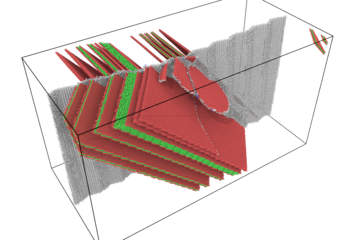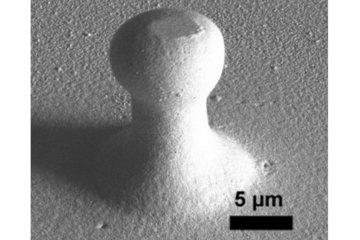All genres
81.
Talk
Werkstoffcharakterisierung durch Diffraktion und Tomographie mit Synchrotron-Röntgenstrahlung und Neutronen. Symposium Hochleistungskeramik 2008, TU Hamburg-Harbung (2008)
82.
Talk
In-situ Characterization of Damage Processes using Synchrotron Radiation. International Conference "Advanced Processing for Novel Functional Materials", Dresden, Germany (2008)
83.
Talk
In-situ Characterisation of Creep Damage Evolution in Metallic Materials using Synchrotron Tomography. Symposium "Microstructural Characterisation down to the Atomic Scale", Leoben / Österreich (2007)
84.
Talk
In-situ investigation of creep damage using synchrotron X-ray microtomography. Lenkungsausschuss der AGHT, Düsseldorf (2007)
85.
Talk
Friction Stir Welding of ZStE340 High-strength Steel and AA6181-T4 Aluminium Alloy. SOLVSTIR - International Seminar on Friction Stir Welding of Steels, Geesthacht (2007)
86.
Talk
Effect of substrate microstructure on phase, texture and internal stress evolution in iron oxide layers grown at 650 °C. Zeit- und temperaturaufgelöste Röntgen-Pulver-Diffraktometrie VIII, Fraunhofer ICT, Pfinztal, Germany (2007)
87.
Talk
Caracterizacion in-situ en 3D de Danos durante creep usando XMT. Seminario de Ciencias de Mateariales, Huelva, Spain (2007)
88.
Talk
Eigenspannungen am Hummerexoskelett. Sitzung des FA 13 Eigenspannungen am AWT, IFW Dresden, Germany (2007)
89.
Talk
Tomography combined with diffraction. 2nd GKSS/DESY Workshop High Energy Materials Science at PETRA III, Hamburg (2007)
90.
Talk
Phase composition and internal stress development during the oxidation of iron aluminides. Final Conference COST Action 535 Thermodynamics of Alloyed Aluminides (THALU) and 4th Discussion Meeting on the Development of Innovative Iron Aluminium Alloys, Interlaken, Switzerland (2007)
91.
Talk
In-situ phase analysis and stress evolution in iron oxides on iron poly and single crystals. Size-Strain V, Garmisch-Partenkirchen (2007)
92.
Talk
Study of Microstructure and Residual Stresses in Dissimilar Al/Steel Welds Produced by Cold Metal Transfer. MECASENS IV, Wien (2007)
93.
Talk
Influence of Microblasting on the Microstructure and Residual Stresses of CVD k-AlO3 Coated Hardmetals. MECASENS, Wien (2007)
94.
Talk
Microstructure and residual stress of Nd:YAG laser AZ31B butt welds. MECASENS IV, Wien, Austria (2007)
95.
Talk
Effect of substrate orientation on the phase and internal stress evolution in iron oxide layers. MECASENS IV, Wien, Austria (2007)
96.
Talk
Residual Stresses in the Exoskeleton of a Homarus americanus Lobster. MECASENS IV, Wien (2007)
97.
Talk
Al/Steel welds: Fundamental investigation of intermetallic phases. 4th Discussion Meeting on the Development of Innovative Iron Aluminium Alloys, FeAl2007, Interlaken, Switzerland (2007)
98.
Talk
Förderung des wissenschaftlichen Nachwuchses in der MPG. GAIN-Jahrestagung, San Francisco, CA, USA (2007)
99.
Talk
Residual stresses in engineering materials. VI-PNAM Autumn School: Application of Neutrons and Synchrotron Radiation in Engineering Materials Science, Hamburg (2007)
100.
Talk
Quantitative assessment of inhomogeneous creep cavity distribution. E.MRD Fall Meeting 2007, Warsaw, Poland (2007)











